
The field of library science, especially in this Information Age, has evolved far beyond stacking books and memorizing the Dewey Decimal System. An advanced degree in library science can give you the key to enter a profession that conserves, transmits, and gives access to information, thereby preserving and advancing our world's cultural, social, and scientific knowledge. The constant churn and change in technological innovation call for people who understand more than the how, what, and why of digital information, but how to make use of the knowledge.
Text that once was available only on paper is being digitized at ever-increasing levels, filling the electronic archives and special collections in libraries, museums, and businesses. Graduates from the master's programs listed here gain familiarity with the concepts and language used in appraisal, arrangement, description, preservation, and conservation of information. Another popular career path is youth services and school librarianship which involve studying literature, oral-tradition storytelling, folklore, and relationships between readers and writers in various literacies.
The professional application of a master's degree in library science has numerous opportunities inside and outside the walls of the world's libraries. They include careers such as School or Law Librarian, Museum professional, Archivist, Web Analytics Manager, Web Developer or Administrator, Information Resources Specialist, Information Architect, Metadata Analyst, Acquisitions Manager, Business Researcher, Web Project Manager, Business Information Specialist, Database Administrator or Programmer, and many more!
Average salaries range from $44,000 as a museum professional to $80,000 as a database administrator. Other salary estimates include $57,000 a year as a public librarian, $60,000 as a law librarian, $75,000 as a web project manager, and over $47,000 as an archivist. It's no secret that the modern global workplace relies on fast, accurate information. Managers of this knowledge research, organize, and analyze information on which major strategic decisions are based. The colleges and universities on this list give the best combination of value and academic rigor for a master's degree in library science.
Ranking Methodology: "It's science!"
The researchers and writers at Best Master's Degrees don't make recommendations based upon preference– we back our rankings with science. Here's a quick breakdown of how we organize ranking data:
- Finances (40%)
- Academic Rigor (35%)
- Student Gratification (25%)
Nearly half of the data used to score each ranking involves finances and are acquired from sources such as the National Center for Education Statistics, the U.S. Department of Labor, U.S. Department of Education, Glassdoor, and PayScale. Financial data encompasses the cost of tuition, fees, and class supplied; the average price of living; access to financial aid and social services; and lastly, the projected annual salary acquired from degree outcomes and income for loan repayment. The second largest category of information involves the quality of education, how competitive degree applicants should be for consideration, and how exclusive a degree program is overall. The final 25 percent of collected data is dependent on student and alumni reviews from sources such as PayScale, Rate My Professor, and Students Review.
Want to Learn More?
The amount of information available for specific degrees is plentiful, and Best Master's Degrees aims to provide as many resources as we can. Check out our Methodology page for more information and resource links.
#20 – University of Illinois at Urbana-Champaign
MS in Library and Information Science
Champaign, IL
Website

llinois' MS in Library and Information Sciences program has six professional pathways.
The Library and Information Science program from the University of Illinois at Urbana-Champaign is made up of 40 credit hours of work and can be completed on the Champaign, IL, campus or online in 12 months. The degree is accredited by the American Library Association. All students take two core courses, then map out a path of coursework that aligns with their career goals. Pathways include youth and School Librarianship, Research and Information Services, or Knowledge and Management and Competitive Intelligence. Students in the program had a graduation rate of 86 percent or higher, both for on-campus and online study, for every academic year from 2012-13 to 2016-17. According to a survey conducted for Illinois' School of Information Services, 72.5 percent of master's program graduates from 2014 to 2018 were working full-time, with an average salary of $48,239. Illinois ranks No. 1 on U.S. News and World Report's list of Best Master's in Library and Information Studies Programs. Courses in the program include Fantasy Literature and Media for Youth; Museum Informatics; and Information Consulting. Application requirements include a resumé, three letters of reference, and a personal statement describing goals with the degree. GRE or GMAT scores aren't required if you earned a 3.0 GPA or better in the last two years of undergraduate study.
Net Price: $16,638
#19 – Florida State University
Master of Science in Information
Tallahassee, FL
Website
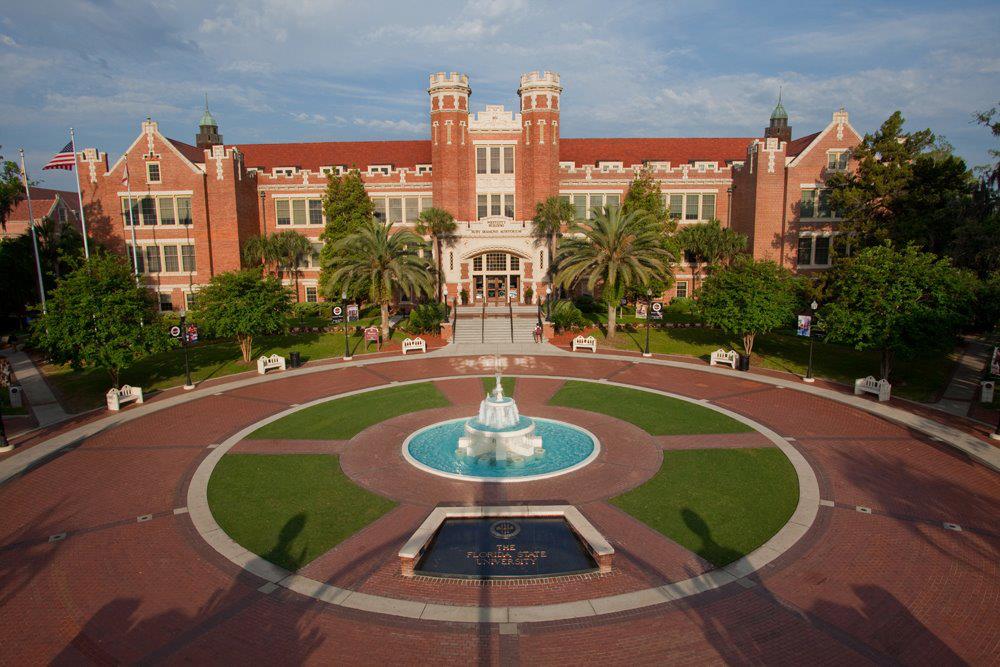
The program doesn't require a thesis, but if you choose to do one it will use six of the 36 required credit hours.
Florida State's MS in Information degree requires 36 semester hours of coursework. Students take four core courses, then choose a path of study that best meets career goals. There are 10 career pathways which include General Librarianship, Health Informatics, Information Organization, Leadership & Management, and Technology & Networking. The master's program, as well as programs for specialist degrees and professional certificates, can be taken fully online. Each online class meets once a week in the evening. Online classes use a combination of the Blackboard and Collaborate platforms. On-campus students can take advantage of the IDEA Learning Program (Innovation, Digital fluency, Entrepreneurship, Advocacy), which emphasizes interdisciplinary collaboration in several career paths. Florida State's MS program is accredited by the American Library Association. It is tied for #12 on U.S. News and World Report's list of Best Master's in Library and Information Studies Programs. Application requirements include a resumé, a statement of purpose related to the degree, and a sample of academic or professional writing, such as a research paper. Students also can pursue a program that leads to an MS in Information and a JD from Florida State's College of Law. Interested students must be accepted in both the law college and the School of Information.
Net Price: $16,450
#18 – University of Michigan-Ann Arbor
Master of Science in Information
Ann Arbor, MI
Website

Michigan's MS in Information program attracts students from more than 100 undergraduate majors.
University of Michigan-Ann Arbor's Masters of Science in Information (MSI) program requires 48 semester hours, of which 42 must be taken in the School of Information. Michigan is tied for No. 5 on U.S. News and World Report's list of Best Master's in Library and Information Studies Programs. The MS in Information degree can be completed in two years if you study full-time, or in three to four years if you go part-time. Students must take three hours of cognate instruction. Students have the opportunity to earn between six to nine credit hours with the School of Information's internship program. Students can opt for a double degree, adding the MSI to a degree earned in another school in the University of Michigan system. Students on the research- or academic-oriented track can do a master's thesis, which requires six credit hours. Students who decide not to do a thesis will then complete a three-hour mastery course instead, which demonstrates command of the knowledge and practices necessary for a particular career. Application requirements include an approved bachelor's degree, a resumé, three letters of recommendation, and a statement of purpose.
Net Price: $16,408
#17 – SUNY at Albany
MS in Information Science
Albany, NY
Website

Potential employers know a degree from SUNY at Albany represents up-to-date knowledge, versatility, and internship experience.
SUNY at Albany is tied for No. 22 on U.S. News and World Report's list of Best Master's in Library and Information Studies Programs. Its MS in Information Science requires 36 semester credit hours, which includes 12 credit hours of core work and up to 12 credit hours of career concentration coursework. The core component includes 150 hours of internship, which can be added to your portfolio as you pursue a career. Coursework has five career concentrations: Archives and Records Administration, Information Management and Technology, Library Information and Services, Intelligence Analysis, and Data Analytics. Two related degrees can be completed online: MS in Information Science and MS in Information Science School Library. The latter can lead to a teaching certification. Application requirements for the MS in Information Science include transcripts and a resumé, a statement of background and goals, and names and contact information for three recommenders. The degree is accredited by the American Library Association.
Net Price: $16,100
#16 – Rutgers University-New Brunswick
Master of Information
New Brunswick, NJ
Website

Rutgers-New Brunswick's Master of Information program attracts students with undergraduate backgrounds that range from humanities to computational expertise.
Rutgers University-New Brunswick's Master of Information program is designed to enable information professionals to take advantage of one another's expertise in an effective learning environment. The program has 36 semester credit hours that must be completed in three years. A full-time student can complete the program in one and a half to two years. Rutgers ranks No. 7 on U.S. News and World Report's list of Best Master's in Library and Information Studies Programs. The master's program is accredited by the American Library Association. There are six career concentrations: Library and Information Science, School Librarianship, Data Science, Archives and Preservation, Technology Information and Management, and Interaction Design and Informatics. All but the last concentration can be completed online. The sizes of online classes range from ten to 23 students. Classes include Metadata for the Information Professional, Transformative Library Leadership, and Competitive Intelligence. A statement of purpose and two letters of recommendation are requirements for application. GRE scores are waived for an undergraduate GPA of at least 3.0.
Net Price: $16,016
#15 – University of Wisconsin-Madison
Master of Arts in Library and Information Science
Madison, WI
Website

Classes in UW-Madison's iSchool include Intellectual Freedom, Information Ethics, and Digital Curation.
University of Wisconsin-Madison's Master of Arts in Library and Information and Science program has 39 semester credit hours. Only three courses are required, giving students the flexibility to pursue five career concentrations: Librarianship, Digital Archives, UX and Information Technology, Data/Information Management and Analytics, and Organization of Information. The program can be completed on-campus or online. The online program offers a one-week boot camp on the Madison, WI, campus that teaches you how to be an effective study-at-home learner. UW-Madison accepts students to its School of Information, or iSchool, once a year, for the fall semester. The first deadline is December 15. The program is accredited by the American Library Association. UW-Madison is tied for No. 14 on U.S. News and World Report's list of Best Master's in Library and Information Studies Programs. Minimum application requirements include a bachelor's degree, along with a GPA of 3.0 or higher for the last 60 credit hours of undergraduate work. A previous master's degree would need a cumulative GPA of at least 3.0. No GRE scores are required.
Net Price: $15,910
#14 – University of Arizona
Master of Arts in Library and Information Science
Tucson, AZ
Website

Arizona's MA in Library and Information Science focuses on the organization of information, along with health sciences and law.
The University of Arizona's Master of Arts in Library and Information Science program has 37 semester credit hours. All classwork can be completed on the Tucson, AZ, campus or online through Arizona's School of Information which is a part of the College of Social & Behavioral Sciences. The program is accredited by the American Library Association. There are seven career concentrations: Academic Librarianship, Law Librarianship, Public Librarianship, Special Librarianship, Archival Studies, Digital Information Management, Legal Information and Scholarly Communication, and Medical and Community Health Information. The last five concentrations are offered as graduate certificate programs. There are 15 credits of core courses, nine credits of electives distributed over three approved categories, and another 12 credits of electives. Application requirements include a resumé or curriculum vitae, a statement of purpose and introduction which includes 750 to 1,000 words, GRE scores, and contact information for two recommenders.
Net Price: $15,758
#13 – University of Iowa
Master of Arts in Library and Information Science
Iowa City, IA
Website

A thesis, in lieu of a career development portfolio, is available for Library and Information Studies students who want more research experience.
University of Iowa's School of Library & Information Science offers a graduate program that requires 36 semester credit hours. Iowa ranks No. 32 on U.S. News and World Report's list of Best Master's in Library and Information Studies Programs. The program gives students solid foundation in what it means to be a librarian, emphasizing the newest technological innovations. Students can complete the program in two years if they average nine credits a semester. The curriculum is two-tiered. The first tier is the five foundation courses. The second tier is the elective coursework. Specialized areas of study in librarianship include Digital Humanities, Informatics, School Media, Book Studies, and Law Librarianship. Courses include Cultural Heritage, Database Management, Health Informatics, and Information Behavior. Application requirements include a bachelor's degree with a minimum GPA of 3.0 (GRE scores are not required), a resumé or curriculum vitae, a statement of purpose, and three letters of recommendation.
Net Price: $14,485
#12 – University of California-Los Angeles
Master of Library & Information Science
Los Angeles, CA
Website
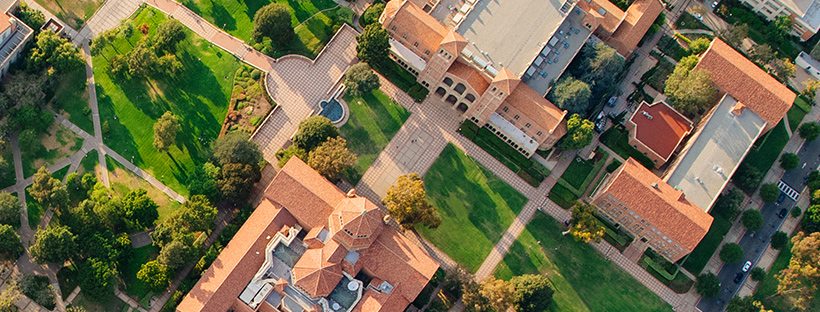
From 2013 to 2017, 73 percent of applicants to UCLA's MLIS program were admitted.
The Master of Library & Information Science program at the University of California-Los Angeles gives students a strong combination of academic knowledge and practical experience. The program has 18 courses which make up 72 quarter units. Students take 16 units of required courses, four units of research method courses, and 52 units of electives. Fields of specialization include Archival Studies, Informatics, Library Studies, Media Archival Studies, as well as Rare Books, Print, and Visual Culture. An internship program involving over 300 organizations across Southern California gives students the chance to apply what they're learning to a professional environment. According to UCLA data, students complete the program in an average of two years. In addition, 99 percent of MLIS graduates between 2015 and 2018 hold jobs relative to their degree. The program is accredited by the American Library Association. UCLA is tied for No. 14 on U.S. News and World Report's list of Best Master's in Library and Information Studies Programs. Students are admitted to the program only during the fall quarter. In addition to a bachelor's or other advanced degrees, application requirements include a resumé or curriculum vitae, GRE scores, a statement of purpose, and three letters of recommendation. Applicants also must have successfully completed, with a "C" grade or better, a college-level class in statistics within the last five years.
Net Price: $14,760
#11 – University of Wisconsin-Milwaukee
Master of Library & Information Science
Milwaukee, WI
Website

UWM's Coordinated Degree Program can help you pursue an MS in Library & Information Science and another master's degree at the same time.
The degree requires 36 graduate credits, of which 30 must be in Library and Information Science. The program can be completed in one and a half to three years. The program is accredited by the American Library Association. UWM is tied for No. 14 on U.S. News and World Report's list of Best Master's in Library and Information Studies Programs. Classes can be taken on the Milwaukee campus or entirely online. Most online students take six credit hours per semester. UWM has no application deadline for the MLIS program. Applicants are accepted in the fall and spring semesters. There are four core courses. Additional courses can be chosen to reflect an area of specialization such as Archival Studies, Information Organization, Information Technology, Library Administration, and different types of libraries such as public, academic, or digital. UWM offers a graduate certification in School Library Media. GRE scores aren't required if the applicant has an advanced degree or has completed undergraduate coursework with a GPA of 3.0 or better. Applicants also must supply two letters of recommendation.
Net Price: $14,445
#10 – University of Texas-Austin
Master of Science in Information Studies
Austin, TX
Website

The iSchool at Texas-Austin as has specialized research labs for subjects such as user experience, digital archiving, conservation, and information retrieval.
The Master of Science in Information Studies degree at the University of Texas-Austin requires 40 semester credit hours – nine hours of core courses in the university's School of Information known as iSchool, 27 hours of elective courses, and four hours for a Capstone Experience course. The program is accredited by the American Library Association. Texas is tied for No. 5 on U.S. News and World Report's list of Best Master's in Library and Information Studies Programs. The MSIS degree is not offered online but some support courses are web-based. Texas-Austin's iSchool teaches students how to design new tools, organize data, and ensure technology is accessible and effective. Students can design coursework around potential careers such as archival studies, social informatics, and information policy and ethics. Recent students in the iSchool had a 70 percent employment rate within three months of graduation. Application requirements include completion of a bachelor's or other advanced degrees with a GPA of at least 3.0, GRE scores, a personal statement of purpose, and letters of recommendation. Students can begin coursework in the fall or spring semesters.
Net Price: $14,356
#9 – Emporia State University
Master of Library Science
Emporia, KS
Website

Emporia State students in the Master of Library Science program take all required courses as a cohort, working together and getting to know each other through projects that require collaboration.
The Master of Library Science program through Emporia State's School of Library and Information Management offers several options for non-traditional students. The program, accredited by the American Library Association, covers 36 semester credit hours. Full-time students can complete the course in four semesters Рabout 16 months. All classes are offered online, with most courses meeting for two weekend residential courses. Classes also are available at several regional locations beyond the main campus in Emporia, KS. Locations include Overland Park, KS; Denver, CO; Portland, OR; and Salt Lake City and Orem, UT. Students go through the MLS degree program as a cohort, which builds a support system during studies and creates a professional network after graduation. The goal of the MLS program is to prepare professionals who will provide effective, client-serving work in information agencies. The coursework is broken down into core theory classes, tool courses, applications courses, electives, and a capstone experience. Requirements for application include the completion of a bachelor's degree with a minimum GPA of 3.0, a resum̩ or curriculum vitae, a statement of objectives, and two letters of reference.
Net Price: $14,013
#8 – Valdosta State University
Master of Library and Information Science
Valdosta, GA
Website
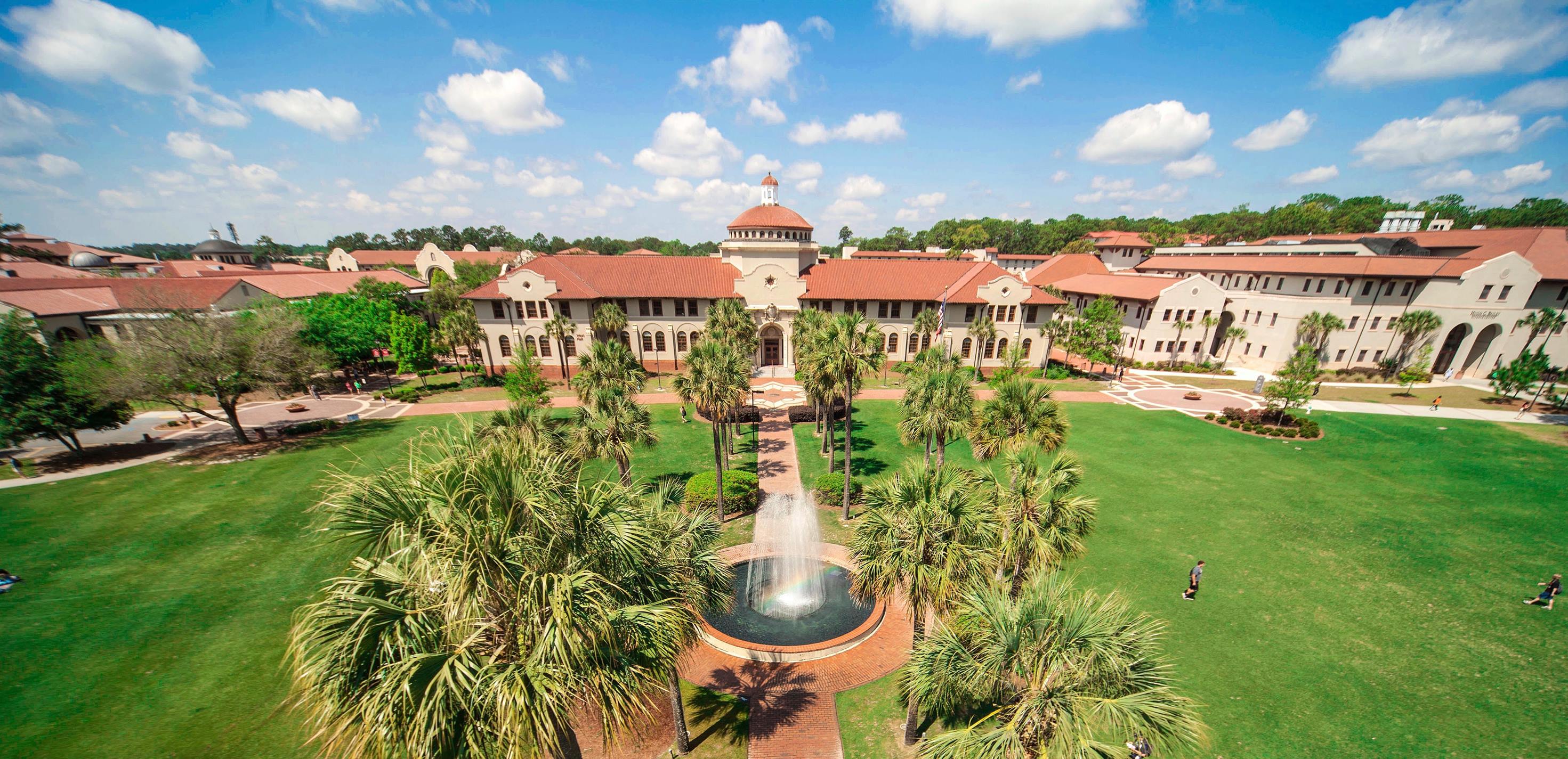
Flexible scheduling and enrollment options make Valdosta State's Master of Library and Information Science program a good option for working professionals.
Valdosta State University's Master of Library and Information Science degree has 39 semester credit hours. The program, accredited by the American Libary Association, focuses on educating librarians for academic, public and special libraries in Georgia and beyond. The MLIS program does not require a thesis and is conducted primarily online. Professors are dedicated to distance education methods and the program has flexible scheduling so students can work and spend time with their families. MLIS students acquire skills in organizing and retrieving information, along with information services, resources, and systems. Optional tracks are available in cataloging and classification, library management, technology, and reference sources and services. Students must complete a capstone course in their final semester. Requirements for application include the completion of a bachelor's degree with a minimum GPA of 3.0, a resumé or curriculum vitae, three letters of recommendation, and a statement that describes your interest in the program.
Net Price: $13,978
#7 – Wayne State University
Master of Library and Information Science
Detroit, MI
Website

Graduates of Wayne State's Master of Library and Information Science program will be able to determine the significance of intellectual property, security, and privacy issues.
The goal of Wayne State University's Master of Library and Information Science (MLIS) degree is to prepare students for future professional leadership roles in libraries and other information organizations. The program is accredited by the American Library Association. The MLIS degree requires 36 graduate semester credit hours, which is broken down into 18 credit hours in the information sciences core and at 18 credit hours in an area of professional specialization. A maximum of six credit hours in courses outside of Wayne State's School of Information Science can be accepted as cognates. The MLIS degree is available online. Selected classes are offered on-campus. The degree has three pillars: library services, information management, and archives and digital content management. Elective courses can drill down to more detailed specializations within these pillars. Application requirements include a resumé or curriculum vitae, an advanced degree or a bachelor's degree with a minimum 3.0 GPA, and a statement of academic background and experience.
Net Price: $13,287
#6 – University at Buffalo
Information and Library Science, MS
Buffalo, NY
Website

The music librarianship specialty in University of Buffalo's Information and Library Science degree combines a master's degree in music.
The University at Buffalo's Master in Information and Library Science program is offered fully online. Buffalo is tied for No. 22 on U.S. News and World Report's list of Best Master's in Library and Information Studies Programs. The program is accredited by the American Library Association. The Buffalo degree requires 36 credit hours. A full-time student can complete the program in four semesters. The program, however, does have the flexibility to accommodate distance-learning students who need a part-time course load. Specialized program options include music librarianship and law librarianship. There also are practicums, special projects and directed study courses that allow a student to gain real-world experience. The required credit hours include nine hours of core classes and 27 hours of coursework that align with professional specialties. Options include information management or organization; public or academic libraries; and special libraries such as museums and businesses. Application requirements include the completion of a bachelor's degree with a minimum 3.0 GPA, GRE/MAT scores which can be waived if you already have an advanced degree, contact information for three people who will be asked to write letters of recommendation, as well as a statement of education and career goals.
Net Price: $12,594
#5 – Indiana University Bloomington
Master of Library Science
Bloomington, IL
Website
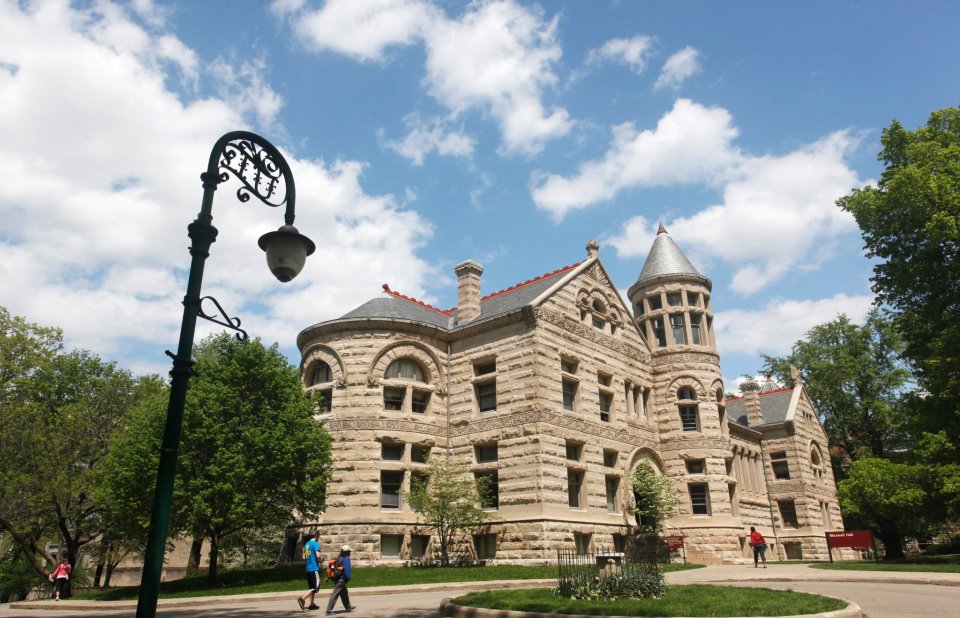
Courses for Indiana's Master of Library Science include Database Design, Social Science Information, and Human-Computer Interaction.
Indiana University Bloomington's Master of Library Science is a 36 semester credit hour program that includes 15 hours of core courses and 21 hours of elective courses that match your professional goals. A degree program for a master's degree in Library and Information Services can be taken fully online. Indiana ranks No. 9 on U.S. News and World Report's list of Best Master's in Library and Information Studies Programs. The online and on-campus programs are accredited by the American Library Association. According to data from the university, 95 percent of MLS students found jobs or continued their education within 12 months of graduating. Indiana's MLS degree focuses on digital changes occurring with information and prepares students for the latest innovations. It also gives students experience with traditional sources such as rare books, manuscripts, and archives. Students can pursue dual master's degrees in Library Science and Information Science through Indiana's School of Informatics, Computing, & Engineering. Application requirements include GRE scores or an advanced degree, a resumé or curriculum vitae, three letters of recommendation, as well as a personal essay explaining academic and career objectives.
Net Price: $12,488
#4 – University of North Carolina at Chapel Hill
Master of Science in Library Science
Chapel Hill, NC
Website
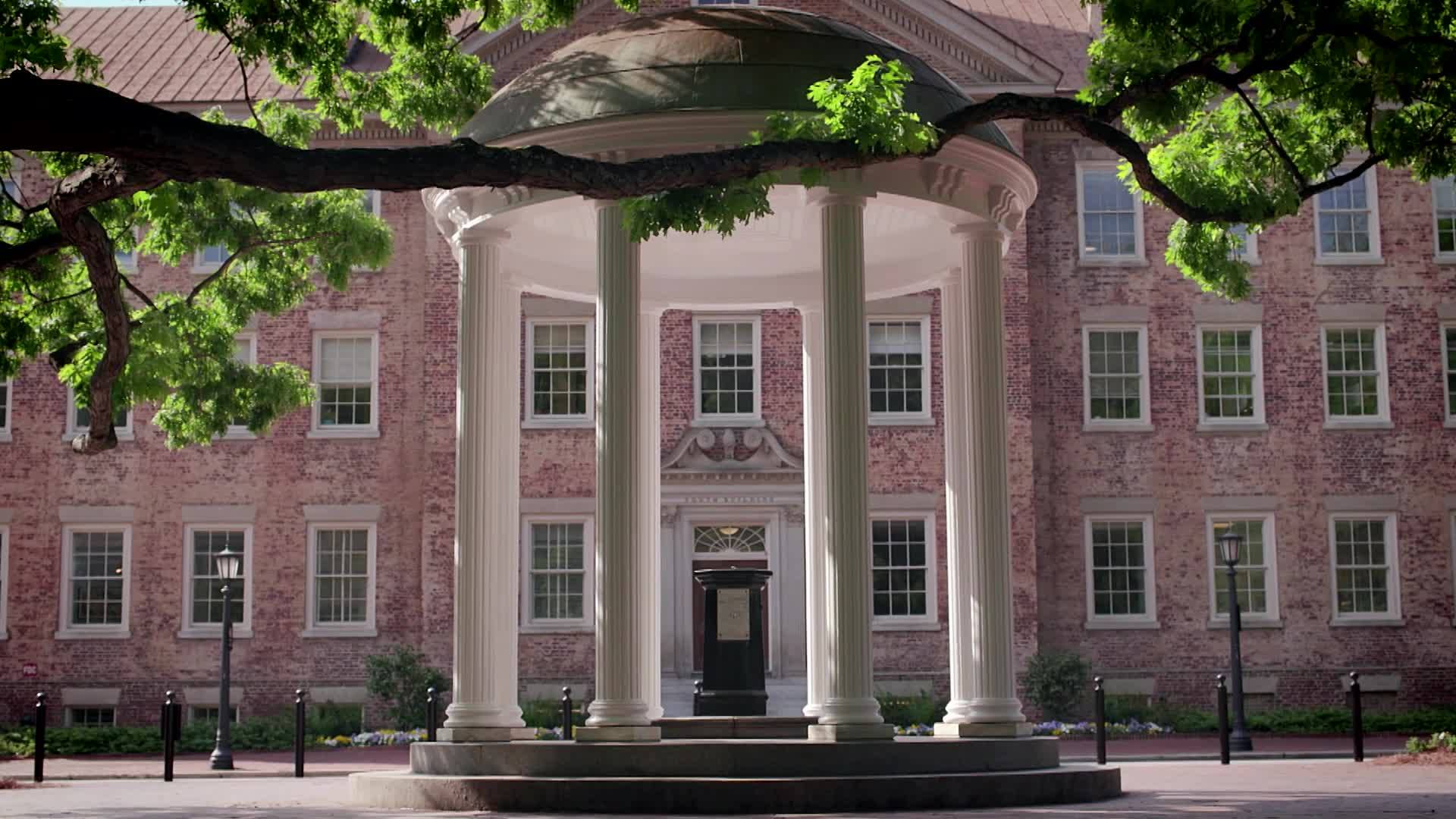
Graduates of North Carolina's Master of Science in Library Science program are prepared to develop strategies that improve access to information.
The University of North Carolina at Chapel Hill ranks No. 3 on U.S. News and World Report's list of Best Master's in Library and Information Studies Programs. The Master of Science in Library Science program is accredited by the American Library Association. The program calls for 48 semester hours of graduate-level coursework, including 22.5 hours of required core courses and 25.5 hours of elective core courses. Graduates also must complete a comprehensive exam and a master's paper or project. Online classes in the graduate program are not available. According to data from North Carolina's School of Information and Library Science, the average time to complete the master's degree is two years. Among students who graduated in 2018, 71 percent held jobs related to their degree within 12 months of graduation. Those who graduated in 2017 had a job rate of 89 percent. A Field Experience Program offered by SILS enables students to gain 135 hours of professional experience in an information organization while receiving three hours of class credit. MSLS study has several opportunities to study abroad in locations such as London, Prague, Berlin, Madrid, and Seoul. Applications require a resumé, GRE scores including a minimum score of 50 percent in the verbal and quantitative sections and at least a four in the writing section, a statement of purpose, and three letters of recommendation.
Net Price: $11,100
#3 – University of North Carolina at Greensboro
Master of Library and Information Studies
Greensboro, NC
Website

Many who apply to UNC-Greensboro's Master of Library and Information Studies program have worked in libraries as undergraduates and want to prepare for leadership in information organizations.
The Master of Library and Information Studies program at the University of North Carolina at Greensboro prepares students for positions of leadership in academic, public, school, and special libraries, as well as roles in public and private agencies and cultural organizations as information specialists. UNC Greensboro is tied for No. 22 on U.S. News and World Report's list of Best Master's in Library and Information Studies Programs. The program is accredited by the American Library Association. The degree calls for 36 semester credit hours in UNC Greensboro's School of Education, but cognate classes from other departments can be substituted with approval. There are 13 hours of required courses, which includes a capstone project in lieu of a thesis. Nineteen credit hours can be electives that align with a career goal. Specialties can include cataloging, digital collections, school libraries, and public libraries. All coursework for the MLIS can be taken online, primarily with chats, video conferencing, and other live instruction. Application requirements include a bachelor's degree with a minimum 3.0 GPA or another advanced degree, a resumé, and a personal statement of academic and career goals.
Net Price: $10,496
#2 – University of Washington
Master of Library and Information Science
Seattle, WA
Website

Washington offers a Master of Library and Information Science degree with a specialization in law librarianship.
The University of Washington's Information School, known as the iSchool, offers a Master of Library and Information Science degree. Coursework can be taken on campus in Seattle, WA, or online. The program has a low student-to-faculty ratio and a strong track record of employment in libraries, nonprofits, and corporations. Recent graduates have gone to work as librarians, metadata specialists, web content managers, and taxonomists. Washington ranks No. 2 on U.S. News and World Report's list of Best Master's in Library and Information Studies Programs. The program is accredited by the American Library Association. The program is made up of 63 quarter credits which are spread across three elements. These are core courses, electives, and a final degree project. Both on-campus and online students have the same degree requirements. As for time required to complete the degree, 83 percent of on-campus students who entered the program in 2016 graduated in two years or less, and 71 percent who began online courses in 2015 graduated in three years or less. The curriculum includes a final capstone project. The iSchool offers study-abroad programs between the summer and autumn quarters. Locations include the Netherlands, South Korea, and China. Application requirements include a completed bachelor's degree with a minimum GPA of 3.0, a resumé or curriculum vitae, a personal statement of academic and career goals, and three letters of recommendation.
Net Price: $9,443
#1 – Queens College, City University of New York
Master of Library Science
Flushing, NY
Website

Alumni of Queens College's Master of Library Science program include librarians at New York University-Shanghai and the creator/director of the Queens Memory Project.
The Master of Library Science degree at Queens College is designed to prepare graduates for positions in inside and outside academic venues – nearly anywhere information is stored, preserved, and accessed. Queens College ranks No. 40 on U.S. News and World Report's list of Best Master's in Library and Information Studies Programs. The program is accredited by the American Library Association. Students intern at institutions like the Center for Jewish History and the Metropolitan Museum of Art. Studies can align with career concentrations such as archiving and preservation, public library services, library media specialist, academic librarianship, and digital resources management. Students also can pursue a dual degree in library science and history. The MLS degree consists of 36 semester credit hours, which must be completed within four years of admission. There are four required core courses, plus a required project course that can be taken after 21 credit hours are completed. Applicants to the MLS degree program need undergraduate work with a GPA of at least 3.0. Those with a lower GPA may be required to take the GRE. Other application requirements include three letters of recommendation and an essay about your reasons for pursuing graduate study.